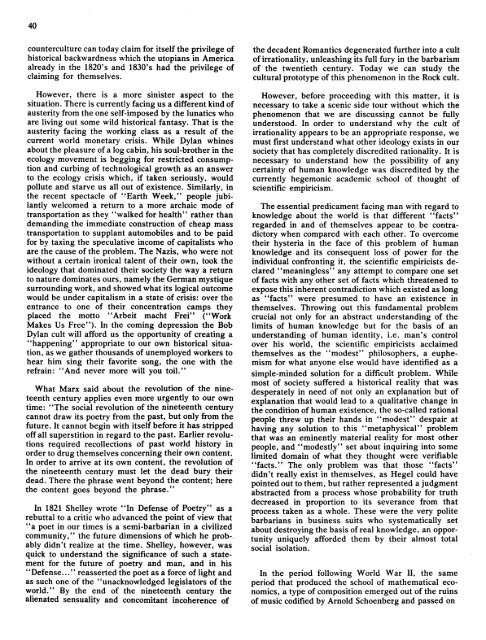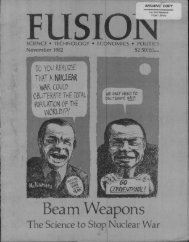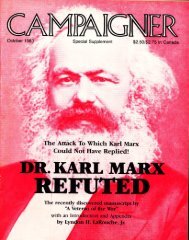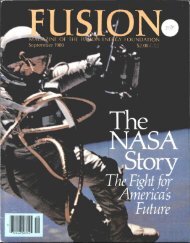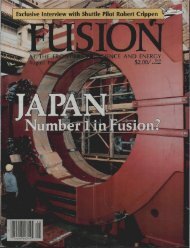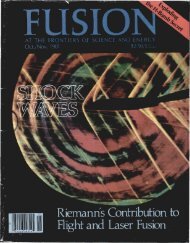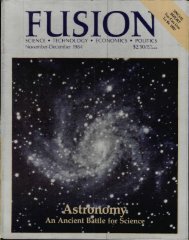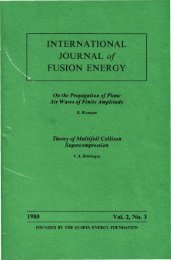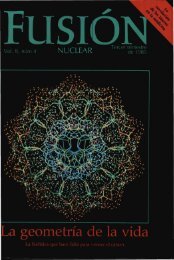New Left, Local Control, and Fascism
New Left, Local Control, and Fascism
New Left, Local Control, and Fascism
You also want an ePaper? Increase the reach of your titles
YUMPU automatically turns print PDFs into web optimized ePapers that Google loves.
40<br />
counterculture can today claim for itself the privilege of the decadent Romantics degenerated further into a cult<br />
historical backwardness which the utopians in America of irrationality, unleashing its full fury in the barbarism<br />
already in the 1820's <strong>and</strong> 1830's had the privilege of of the twentieth century. Today we can study the<br />
claiming for themselves, cultural prototype of this phenomenon in the Rock cult.<br />
However, there is a more sinister aspect to the However, before proceeding with this matter, it is<br />
situation. There is currently facing us a different kind of necessary to take a scenic side tour without which the<br />
austerity from the one self-imposed by the lunatics who phenomenon that we are discussing cannot be fully<br />
are living out some wild historical fantasy. That is the understood. In order to underst<strong>and</strong> why the cult of<br />
austerity facing the working class as a result of the irrationality appears to be an appropriate response, we<br />
current world monetary crisis. While Dylan whines must first underst<strong>and</strong> what other ideology exists in our<br />
about the pleasure of a log cabin, his soul-brother in the society that has completely discredited rationality. It is<br />
ecology movement is begging for restricted consump- necessary to underst<strong>and</strong> how the possibility of any<br />
tion <strong>and</strong> curbing of technological growth as an answer certainty of human knowledge was discredited by the<br />
to the ecology crisis which, if taken seriously, would currently hegemonic academic school of thought of<br />
pollute <strong>and</strong> starve us all out of existence. Similarly, in scientific empiricism.<br />
the recent spectacle of "Earth Week," people jubilantly<br />
welcomed a return to a more archaic mode of The essential predicament facing man with regard to<br />
transportation as they "walked for health" rather than knowledge about the world is that different "facts"<br />
dem<strong>and</strong>ing the immediate construction of cheap mass regarded in <strong>and</strong> of themselves appear to be contratransportation<br />
to supplant automobiles <strong>and</strong> to be paid dictory when compared with each other. To overcome<br />
for by taxing the speculative income of capitalists who their hysteria in the face of this problem of human<br />
are the cause of the problem. The Nazis, who were not knowledge <strong>and</strong> its consequent loss of power for the<br />
without a certain ironical talent of their own, took the individual confronting it, the scientific empiricists deideology<br />
that dominated their society the way a return clared "meaningless" any attempt to compare one set<br />
to nature dominates ours, namely the German mystique of facts with any other set of facts which threatened to<br />
surrounding work, <strong>and</strong> showed what its logical outcome expose this inherent contradiction which existed as long<br />
would be under capitalism in a state of crisis: over the as "facts" were presumed to have an existence in<br />
entrance to one of their concentration camps they themselves. Throwing out this fundamental problem<br />
placed the motto "Arbeit macht Frei" ("Work crucial not only for an abstract underst<strong>and</strong>ing of the<br />
Makes Us Free"). In the coming depression the Bob limits of human knowledge but for the basis of an<br />
Dylan cult will afford us the opportunity of creating a underst<strong>and</strong>ing of human identity, i.e. man's control<br />
"happening" appropriate to our own historical situa- over his world, the scientific empiricists acclaimed<br />
tion, as we gather thous<strong>and</strong>s of unemployed workers to themselves as the "modest" philosophers, a euphehear<br />
him sing their favorite song, the one with the mism for what anyone else would have identified as a<br />
refrain: "And never more will you toil." simple-minded solution for a difficult problem. While<br />
most of society suffered a historical reality that was<br />
What Marx said about the revolution of the nine- desperately in need of not only an explanation but of<br />
teenth century applies even more urgently to our own explanation that would lead to a qualitative change in<br />
time: "The social revolution of the nineteenth century the condition of human existence, the so-called rational<br />
cannot draw its poetry from the past, but only from the people threw up their h<strong>and</strong>s in "modest" despair at<br />
future. It cannot begin with itself before it has stripped having any solution to this "metaphysical" problem<br />
off all superstition in regard to the past. Earlier revolu- that was an eminently material reality for most other<br />
tions required recollections of past world history in people, <strong>and</strong> "modestly" set about inquiring into some<br />
order to drug themselves concerning their own content, limited domain of what they thought were verifiable<br />
In order to arrive at its own content, the revolution of "facts." The only problem was that those "facts"<br />
the nineteenth century must let the dead bury their didn't really exist in themselves, as Hegel could have<br />
dead. There the phrase went beyond the content; here pointed out to them, but rather represented a judgment<br />
the content goes beyond the phrase." abstracted from a process whose probability for truth<br />
decreased in proportion to its severance from that<br />
In 1821 Shelley wrote "In Defense of Poetry" as a process taken as a whole. These were the very polite<br />
rebuttal to a critic who advanced the point of view that barbarians in business suits who systematically set<br />
"a poet in our times is a semi-barbarian in a civilized about destroying the basis of real knowledge, an opporcommunity,"<br />
the future dimensions of which he prob- tunity uniquely afforded them by their almost total<br />
ably didn't realize at the time. Shelley, however, was social isolation.<br />
quick to underst<strong>and</strong> the significance of such a statement<br />
for the future of poetry <strong>and</strong> man, <strong>and</strong> in his<br />
"Defense..." reasserted the poet as a force of light <strong>and</strong> In the period following World War II, the same<br />
as such one of the "unacknowledged legislators of the period that produced the school of mathematical ecoworld."<br />
By the end of the nineteenth century the nomics, a type of composition emerged out of the ruins<br />
alienated sensuality <strong>and</strong> concomitant incoherence of of music codified by Arnold Schoenberg <strong>and</strong> passed on


